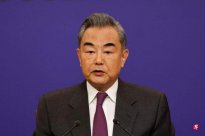The United States reportedly put pressure on allies such as the Netherlands, Germany, South Korea, and Japan, asking them to further tighten the restrictions on China's acquisition of semiconductor technology.
According to Bloomberg News on Wednesday (March 6), people familiar with the matter reported that the purpose of this move was to fill the vulnerabilities that appeared in export control in the past two years and restricted China's progress in developing domestic chip capabilities.This controversial measures encountered resistance in some countries.
People familiar with the matter said that the United States has urged the Netherlands to prevent the Light Carrving Giant ASML (ASML) for Chinese customers' sales of sensitive chip manufacturing equipment restrictions on this type of equipment purchased before this year.
The United States also hopes that Japanese companies will restrict important chemicals that Chinese companies will use in manufacturing chips.Japan is the location of the leading enterprises in the field of photoresmal glue in JSR and Xinyue Group.
People familiar with the matter said that Japan and the Netherlands responded indifferent to the latest measures in the United States.The two countries emphasize that they hope to evaluate the impact of existing restrictions before considering taking stricter measures.At a export control conference held in Tokyo last month at a export control meeting last month, the US Department of Commerce proposed this subject.
Asmore, representatives of the Dutch Trade, and the US National Security Council and the US Department of Commerce refused to comment.
According to Reuters, an official in the Ministry of Economic and Industry of Japan said that the department often discusses export control issues with relevant countries.
The United States has aimed at the Chinese semiconductor industry since 2022. It has comprehensively implemented export control for advanced chip manufacturing machines and precision chips used to develop artificial intelligence.Japan and the Netherlands, the major countries of the two major development chip manufacturing equipment, joined the ranks of the United States last year.
Nevertheless, the vulnerability still exists, especially the flow of spare parts used by Japan and the Netherlands to continue to perform some equipment maintenance work, as well as semiconductor manufacturing equipment.



